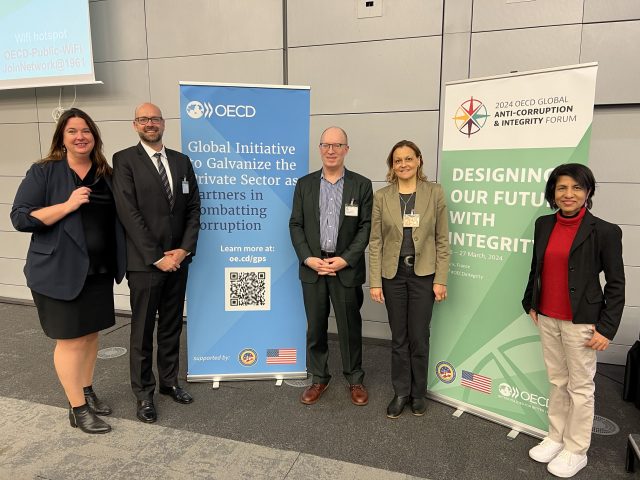Anti-Corruption Efforts in the Private Sector
An important benchmark in the anti-corruption field is the extent to which the private sector devotes effort, expertise, and resources to drive company-level anti-bribery programs as well as external initiatives to push back against the pernicious effects of corruption in society.
One revealing snapshot of private sector thinking and commitment to anti-corruption came in late March in Paris: Though focused primarily on its 38 member countries, the Global Anti-Corruption and Integrity Forum (GACIF) — hosted by the Organisation for Economic Co-operation and Development (OECD) — is a traditionally useful occasion to reflect on the state of private sector engagement in anti-corruption. The two-day forum attended by 950 people provided an opportunity to listen and to take stock, compare notes and share emerging thinking.

Members of CIPE’s Anti-Corruption and Governance Center (ACGC), including us, from three continents joined the 12th GACIF forum from March 26 through 27, organizing and chairing private sector-oriented sessions on topics ranging from business integrity in the Asia-Pacific region to tech solutions in fighting corruption.
Overall, the ACGC team came away with a welcome sense that the business community is nearing an inflection point. Private sector partners from different industries, government, and civil society brought a tangible sense of energy to the forum, showed pride in the progress made and voiced a growing expectation to move beyond the first generation of compliance-based anti-corruption approaches toward more sophisticated and holistic approaches to strengthening integrity.
One initiative that energizes and coalesces the private sector’s potential to drive broader progress at a time when longstanding rule-of-law norms are at risk is the “Galvanizing the Private Sector as Partners in Combating Corruption” (GPS) program. Funded by the U.S. State Department’s Bureau of International Narcotics and Law Enforcement, the GPS initiative has the potential to catalyze and sharpen the private sector’s role in curbing corruption as well as encouraging global, regional, and industry-specific leadership.
Key Takeaways
Reflecting on GACIF, three strands of private sector-related discussions stand out:
First, propelled by decades of work in response to anti-corruption regulatory efforts such as the U.S. Foreign Corrupt Practices Act (FCPA), the 1999 OECD Anti-Corruption Bribery Convention, and subsequent recommendations, the private sector — especially large and multinational corporations — has made tremendous advances in setting out, refining and mainstreaming compliance-based anti-corruption approaches. Though much has been achieved, there is a clear gap between the progress large corporations have made and the capabilities that small and medium-sized enterprises (SMEs) can muster and bring to the table. Many of the discussions at GACIF helpfully highlighted entry points to bring smaller companies into the fold. There is a growing base of evidence that such efforts can be successful if programs are created in context-sensitive ways that focus on the alignment of interests between large and small companies to ensure resilience across supply chain relationships
Second, companies like those in OECD’s Anti-Corruption Leadership Hub increasingly focus their attention on the utility of collective action approaches that go beyond regulatory compliance. Identifying joint incentives and building coalitions between companies in specific sectors has been tested and tried successfully by several initiatives over the years. However, building trust is time-consuming and resource-intensive. Programs such as GPS, implemented in tandem between the Infrastructure Transparency Initiative, OECD, and CIPE, provide exciting opportunities to translate global momentum into region- and industry-specific progress.
To expand and intensify collective action efforts, it is important for all stakeholders to scout for alignment of incentives not just around a narrow set of anti-corruption goals but around a more broadly defined responsible business agenda.
Third, GACIF participants were clear about the need to ensure that government capabilities match the progress made by the private sector. Attendees highlighted the need for regulatory agencies to be adequately resourced and politically independent to ensure technical oversight functions are implemented fairly and within a reasonable amount of time. They also highlighted the need to hold state-owned enterprises to the same standards as other private sector actors. As was discussed in one consultation, the recently passed U.S. Foreign Extortion Prevention Act (FEPA) will likely prove to bolster the ability of governments to fully utilize anti-corruption provisions on the ‘demand’ side of bribery. However, more work needs to be done to sensitize governments and bolster their own compliance and enforcement capabilities.
Looking Forward
Overall, GACIF 2024 signaled a potential sea change in the anti-corruption community: Building on a first generation of successful compliance-based approaches to anti-corruption — with more work to be done in terms of breadth and depth — stakeholders can now focus attention and energy on scaling collective action approaches while also ensuring government does not fall behind. GACIF proved that there is considerable appetite and energy to move forward.
Additional representatives of CIPE at the GACIF included Isabel Cane, Strategic Advisor for Global Business Integrity, Katya Lysova, Europe & Eurasia Business Integrity Lead, and Cynthia Gabriel, Senior Anti-Corruption Advisor. They contributed their expertise, both in public sessions and thought leadership, on subjects ranging from critical minerals to Ukraine’s reconstruction and corruption challenges in the Asia-Pacific region.
Published Date: April 12, 2024
